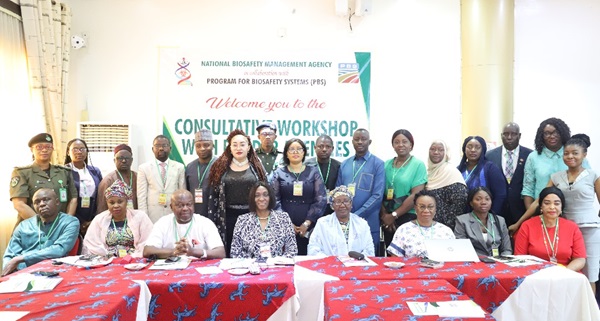
The director-general of the National Biosafety Management Agency (NBMA), Dr. Agnes Asagbra has disclosed that Nigeria has made remarkable strides in biosafety management, particularly in the realm of cross-border trade involving genetically modified organisms (GMOs).
Asagbra disclosed this during a workshop/training session with border agencies in Nigeria, organised by the NBMA with support from the Programme for Biosafety Systems (PBS) in Abuja.
According to Asagbra, Nigeria has successfully cultivated an environment conducive to innovation while upholding stringent biosafety standards. The collaborative efforts with international partners, academic institutions, industry stakeholders and civil society organisations have yielded tangible results in promoting the safe handling and transfer of GMOs across borders.
Despite these achievements, Asagbra acknowledges the persistent challenges in the field of GM cross-border trade. The complexities of logistics and varying interpretations of biosafety regulations pose multifaceted challenges in navigating the landscape of international trade. Addressing these challenges head-on is crucial for meaningful progress and innovation in biosafety management.
In response to the complexities of GM cross-border trade, Nigeria has implemented robust regulatory frameworks and enforcement mechanisms. The NBMA, in collaboration with relevant stakeholders, has diligently worked to safeguard human health, biodiversity and the environment while promoting innovation and sustainable development, Asagbra noted.
Emphasising the importance of inclusive engagement in effective biosafety management, Asagbra stressed the agency’s commitment to fostering collaborative partnerships and platforms for dialogue among border agencies, government entities, academia, industry stakeholders and civil society organisations. By harnessing the collective wisdom and experiences of all stakeholders, the NBMA aims to enhance collective capacity and drive positive change in GM cross-border trade management.
Central to Nigeria’s biosafety management approach is an unwavering commitment to regulatory compliance. The establishment of robust frameworks and enforcement mechanisms ensures adherence to national and international biosafety regulations and standards. Through rigorous monitoring, inspection and certification processes, the NBMA strives to safeguard human health, biodiversity and the environment while facilitating responsible GM cross-border trade.
In remarks by the assistant director of PBS, Mr. John Komen, said Nigeria, through the effective regulation of the NBMA, has made significant strides in biotechnology development, positioning the nation as a leader on the continent.
Komen emphasised the safety of GMOs, asserting that there has been no record of GMOs causing any health or environmental harm globally. He pointed out that South Africa has been dealing with GMOs for over two decades and Nigeria, along with other African countries, is rapidly following suit.
Global scientific consensus supports the safety of GMOs, with 3,000 scientific studies confirming their safety for humans, animals and plants. By 2019, regulatory agencies across the world had granted case-by-case approval for food and feed use and cultivation. Scientific institutions, primarily in Europe, have found that GMOs are safe and offer economic, environmental and scientific benefits.
Similarly, the principal programme officer of the African Union Development Agency (AUDA-NEPAD), Mr. Samuel Timpo underscored the need for the continent to embrace new agricultural practices using technology to drive agriculture. He emphasised the crucial role of a regulatory system, lauding the NBMA for its significant role in ensuring that Nigeria stands out on GMO-related issues and regulations.
Timpo assured that AUDA-NEPAD will continue to support the NBMA to remain a model for other African countries to emulate in the realm of biosafety and GM trade regulation.


